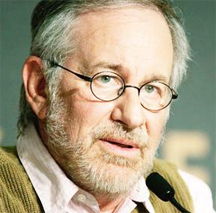LOS ANGELES, (Reuters) – Steven Spielberg is among the most prolific film directors ever, and as if to prove it, he has two movies in theaters this holiday week during what is one of the biggest box office periods of the year.

“The Adventures of Tintin,” a computer animated movie using motion capture technology, is based on the popular books by Belgian writer Herge about an adventurous boy journalist. Spielberg’s “Tintin” follows the boy as he chases clues that lead to pirate treasure.
Spielberg’s other film, “War Horse,” is based on a book and play about the love between a boy and his horse that endures the ravages of World War One. It is the sort of drama that aspires to win Oscars.
Spielberg spoke to Reuters about both films. “Tintin” opens on Friday, Dec. 23, and “War Horse” gallops into theaters on Christmas Day.
Q: You’ve said about “Tintin” that as soon as you read the first of the books, the idea of a movie never left you. Why?
A: “It was just that I had never seen before a character that had so much tenacity to achieve a goal. I think Tintin and I share one thing, we’re both very goal-directed, and I really admired this character.
“Tintin has never ever departed from his goal of being a great journalist and getting to the bottom of a story. Of course, the expected consequence of being so tenacious is that he involves himself in the story, and I do the same thing. I’m a director. I’m always looking for a great story. And when I find one, I involve myself equally in that story.”
Q: “You acquired the rights back in 1983. What took so long to get it to the screen? Was it that you wanted to animate it, but the technology didn’t exist.
A: “In ‘83, not only was there no such thing as performance motion capture technology, there was no such thing as digital animation. This was the analog era. And I was mainly concerned with not getting a script that would (satisfy) the memory millions have of these illustrated characters. So I spent at least a decade trying to develop the script.
“I realized how to make the film when motion capture first reared its beautiful face in ‘The Polar Express,’ and I said, ‘well, you know, I don’t think the technology is there yet to tell ‘Tintin,’ but this is the art form I want to tell the story in. I’m just going to sit around and wait until the art form develops itself a little further.’
Then I thought instead of hiring American screen writers, I’m going to hire European screen writers who grew up and were born with Tintin in their lives … So, two things: the script, number one, and getting people who were raised with Tintin to write the script. And number two, waiting for this new (animation) medium to reach a maturity where I thought I could bring these characters to photo-realistic life where nobody would be complaining that there was no soul in the eyes.
Q: “Tintin” is a rollicking adventure, and “War Horse” is a human tale set during wartime. Both seem very much in line with being “a Spielberg movie.” Is that fair to say?
A: “I don’t know how to define myself or talk about myself in that way because I’m at the disadvantage of being myself. I don’t have that third person point of view.
All I know is that I’m reactive to stories that move me, and ‘War Horse’ makes me cry and ‘Tintin’ makes me breathless and makes me laugh.
“I love changing it up and being able to emotionally tell stories that hit different high notes, and I think there are different high notes both films hit. I don’t think there’s a lot of relation between either, except that families can go to both — older families, ‘War Horse,’ younger families, ‘Tintin.’“
Q: But “War Horse” has that sort of old-school, epic nature with real actors and “Tintin” is very new-school animation. I remember you used to talk about loving to work on film, only. So now, you’ve done both. Which do you prefer?
A: “I’m very blessed that I’m able to do both when I want to do both, and I don’t think
I have to make a choice simply because the digital tools all make sense and let my imagination run free. The analog tools, which I still love, which is pure film, give me a chance to capture what nature provides, and we get to put our actors right in the center of nature and everything it does — the way ‘War Horse’ turned out. So for me, I just feel lucky that I can do both.”
Q: “You turned 65 this month. Retiring anytime soon?
A: “I don’t know, one of my best friends is Clint Eastwood (81) and he’s my guiding light, so as long as he’s good to go, I’m good to go.”





